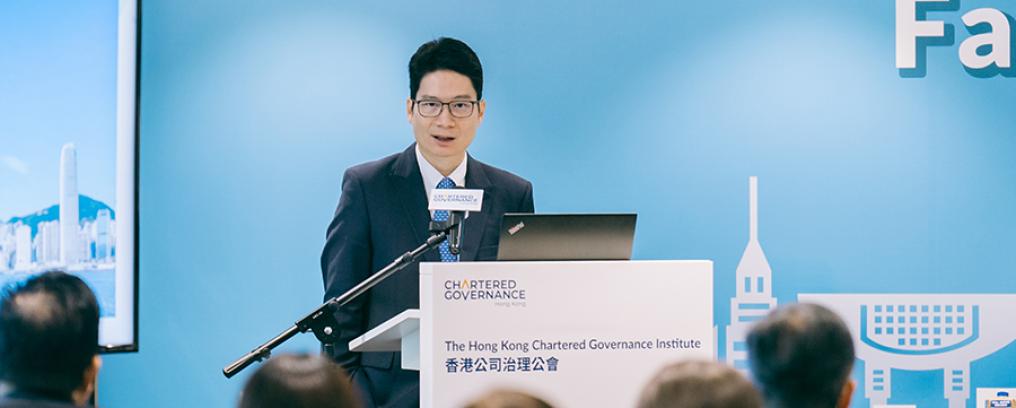In this second article in our NextGen series, CGj interviews Yannis Lau ACG HKACG, Senior Risk Management Consultant, The Hong Kong and China Gas Company Ltd.
What is your current role and what was your career path to this role?
‘I majored in accounting and, like many of my classmates, I joined an accounting firm after graduation for a few years and became a CPA. Later on, I transitioned to become an internal auditor. These past few years, Covid-19 has had a significant impact on the world. I thought that if my work could help manage the potential threats to companies, it would be more challenging and forward-looking. So, I joined the Risk Management Team of The Hong Kong and China Gas Company Ltd. Our team’s responsibility is to support management to monitor risks in different areas from the Group’s perspective and ensure the company's risk control measures are effectively implemented to mitigate risks.’
When did you first hear the terms ‘company secretary’ and ‘governance’? What was your impression of these terms?
‘Back when I was studying at university, I had already heard these terms, but I wasn't quite sure what they actually meant. At that time, I thought that these terms must relate to the work of professionals and senior management with little relevance to me.’
Did your understanding of these terms change as you started your career?
‘Working in risk management, it is necessary for governance professionals to understand the company's operations, as well as any existing and external risks that could affect the Group. For example, during previous instances of typhoons and heavy rain in Hong Kong, many areas experienced flooding. Would these situations potentially impact the security of our company's facilities? I feel that this job carries a sense of purpose and has a significant impact. Our reports help the management team to more efficiently allocate resources and make better decisions.’
What qualities do you think are needed to be a successful governance professional?
‘First, it is important to have enthusiasm for your work, to be willing to invest time and create value, and to provide better solutions regardless of the circumstances. Second, maintaining an open attitude is crucial. Most work today relies heavily on teamwork and requires us to be accepting of different perspectives, as well as actively listening to others’ opinions in order to improve ourselves and adapt to a fast-changing market.’
What was your chosen route to complete the Institute’s qualifying programme and what advice would you give to people who are considering qualifying as a Chartered Secretary and Chartered Governance Professional?
‘I chose to pursue further studies because this route provides a great networking opportunity with classmates who have similar backgrounds, such as internal auditors or even chief finance officers. I encourage everyone not to be afraid of stepping out of their comfort zone. Governance is a vast topic, and each day there are new challenges and changes. First, we should approach these challenges with an open mindset. Second, we should view every failure as a learning opportunity and channel it into motivation for success. Third, it is important to maintain a continuous learning mindset in order to keep progressing and to excel in our roles.’
As a member of the younger generation, how do you think governance will evolve in the future and would you recommend a career in governance to others?
‘I believe that there is significant room for development in this field. Nowadays, many stakeholders have high expectations regarding a company's social responsibility, and the importance of good governance is increasingly recognised and becoming more widely adopted. This industry requires talented individuals, and the field of governance benefits from the inclusion of diverse backgrounds and perspectives. Whether you have a background in law, business, accounting or marketing, this profession requires a broad range of knowledge. I highly encourage anyone who aspires to be an all-round professional in their career to join this field.’
“whether you have a background in law, business, accounting or marketing, this profession requires a broad range of knowledge”
Yannis Lau
ACG HKACG, Senior Risk Management Consultant,
The Hong Kong and China Gas Company Ltd
在我们的新一代治理系列的第二篇文章中,CGj 采访了香港中华煤气有限公司高级风险管理顾问刘蔚茵女士 ACG HKACG。
请问您目前的职位是什么?能告诉我们您的职业发展经历吗?
‘我主修会计,和很多同学一样,大学毕业后在会计师事务所做了几年,成为了一名注册会计师,后来转到别的机构做内部审计。这几年新冠肺炎疫情对全世界有很大的影响,我当时想,如果我的工作可以帮公司对潜在的威胁进行管理,工作应该会更加有挑战性和前瞻性,所以我加入了香港中华煤气有限公司的风险管理团队。我们团队的职责,主要是协助管理层从集团的角度监察不同范畴的风险,确保公司的风控措施能够有效地执行,以减低相关风险。’
您第一次听到‘公司秘书’或‘公司治理’是什么时候?您当时对这些专业名词有什么印象?
‘以前在大学读书的时候已经听过这些专业名词,只不过不太清楚它们实际上是什么意思。当时我觉得,这些专业名词应该与专业人士或高层管理人员的职务有关,和我没有太大关系。’
您开启您的职业道路后对这些专业名词的见解有没有发生改变?
‘对于投身于风险管理的治理专业人士来讲,需要很清楚公司的业务,了解集团现有的风险,以及会影响集团的外部风险。例如之前香港经历台风和暴雨,很多地方水浸,这些情况会不会影响我们公司的设备安全呢?我觉得这份工作很有意义,有很大的影响力,我们的汇报可以帮助管理层进行更有效的资源分配、从而做出更好的决策。’
您认为成功的治理专业人士需要具备哪些素质?
‘第一是对工作要充满热诚,愿意投入时间去创造价值,在任何情况下都能提供更好的解决方案。 第二是保持开放的态度。时至今日,很多工作都讲求团队合作,需要包容和接纳不同的看法,主动聆听别人的意见,这样才会进步,才能适应市场的急速变化。’
您完成公会的资格计划的路径是怎样的?对于那些有想法成为特许秘书和特许治理专业人士的人,您有什么建议?
‘我选择进修,因为一起上课的同学与自己的背景相近,当中有做内部审计,甚至有做首席财务官的同学,是很好的人际交流机会。我建议大家不要怕跳出舒适圈。公司治理是个很大的课题,每天都有新的挑战和变化,所以我们首先要用开放的态度接受挑战;其次是将每一个失败视为学习的机会,将失败转化为成功的动力;第三是要保持不断学习的心态,令自己持续进步 ,将自己的角色发挥得最好。’
作为年轻一代的一员,您认为 ‘治理’将来会如何发展?您会推荐其他人从事治理方面的工作吗?
‘我觉得这个行业有很大的发展空间。现在很多利益相关者对公司的社会责任抱有很高期望,公司治理越来越受重视,也有越来越多机构追求良好的公司治理。这个行业很需要人才,公司治理这个专业需要多元、不同背景的人加入。不论你是读法律、商科、会计还是市场学,这个专业需要的知识面很广。我非常鼓励那些希望在事业上成为全面人才的人加入这个行业。’
“不论你是读法律、商科、会计还是市 场学,这个专业需要的知识面很广”
刘蔚茵女士ACG HKACG
香港中华煤气有限公司高级风险管理顾问



